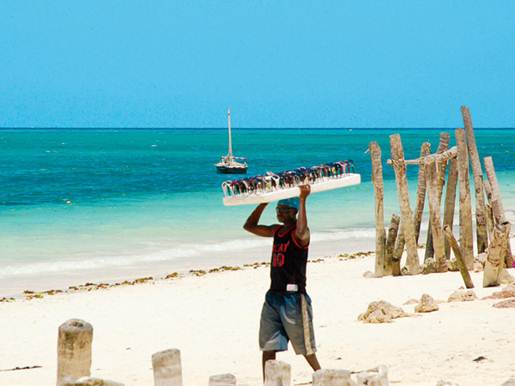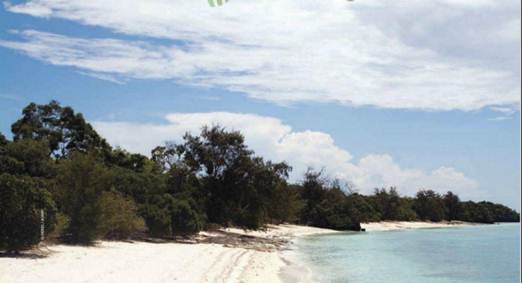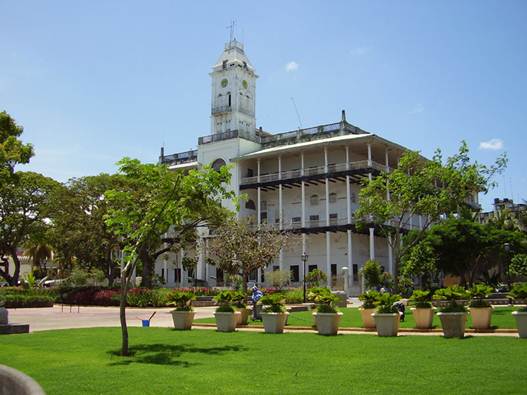Swahili Shores
Pemba, Pangani, Saadani, mafia and
Zanzibar - they are not just exotic names that dance off the tongue, they are
among the many treasures you'll find along the Tanzanian coast. Follow Mary
Fitzpatrick as she explores the shores of this dynamic region

In
Zanzibar, the famous group of islands offs the Tanzanian coast.
The East African coast is timeless. You can
see it in the gnarled bark of baobabs, feel it in the Indian Ocean sunrise, and
absorb it when watching the centuries-old rhythms of local life. The dhows that
slip silently across the horizon at dawn, their patched broadcloth sails filled
by the wind, haven't changed from the ones that passed by a century or three
ago.
In this feature article we set out to
explore Tanzania's 1000km section of coast. On the mainland, long stretches of
sand are interspersed with mangrove forests, ruin-studded inlets, sleepy
villages and a string of old Swahili trading ports. Offshore, the islands beckon
with an ambience all their own, with glinting white beaches, soft sand,
upmarket resorts and a lively fusion of traditional and modern. Both the
mainland coast and the islands offer historical buildings aplenty, a wealth of
birds and marine life, colourful corals and turquoise-hued vistas. Exploring
the area is a delight on its own, or in combination with the country's famous
safari circuits. '
The Islands …
Nowhere along the coats do the
traditional and modern blend with such vitality as on Zanzibar Island (Unguia).
This is the most well-known and by far the most visited of Tanzania's Islands,
the focal point of the clove and slave trades of old and the pulse point of
modern-day Swahili culture.
At Zanzibar's heart is the old Stone Town,
a fascinating blend of times and cultures. Its waterfront is lined with elegant
Omani-era buildings, while its skyline mixes minarets and church steeples with
pitched corrugated iron roofs and a handful of new high-rises. Motorbikes
careen loudly through narrow, cobbled lanes, past Arabic-style houses with
brass-studded wooden doors. Visitors in beach garb wander past Kanzu-Clad men
and bui-bui veiled women. The contrasts between traditional and modem, Western
and Oriental, are everywhere, but somehow the island seems to fuse everything
into a uniquely Zanzibari mix.

This
is the most well-known and by far the most visited of Tanzania's Islands, the
focal point of the clove and slave trades of old and the pulse point of
modern-day Swahili culture.
A fine place to start your Zanzibar
wanderings is at the Beit al-Ajaib (House of Wonders) on the Stone Town
waterfront. Once the ceremonial palace of the Omani sultans, it is now the
Zanzibar National Museum of History and Culture. Just a short walk away, if you
manage not to get lost in the maze of winding lanes, are the Catholic and
Anglican cathedrals, both dating to the late 19th century, when the
archipelago's once-flourishing slave trade was in its waning days. The Anglican
cathedral stands on the site of the old slave market, with some nearby holding
cells a sobering reminder of the not-so-distant past. By exploring Stone Town's
streets, visiting nearby palace ruins and touring the spice plantations that
were once the backbone of the local economy, you will bring Zanzibar's long
history alive.

the
Beit al-Ajaib (House of Wonders)
For a glimpse into modern-day Zanzibari
culture, there's no better time to visit the island than July when the Festival
of the Dhow Countries takes over. This two-week extravaganza includes the
Zanzibar International Film Festival (www.ziff.or.tz), as well as music and dance
performances, and art and craft displays. The extensive programme draws artists
and performers from throughout the region. Stone Town is jam-packed at this
time, and an outreach programme brings the festival to outlying villages as
well. After all this activity, you'll cherish time relaxing on the beaches for
which Zanzibar is famed. With the seemingly uncontrolled spate of hotel
building in the north and east, quiet spots are hard to come by these days, but
the beaches remain stunning, picture-perfect patches of paradise.

the
Zanzibar International Film Festival